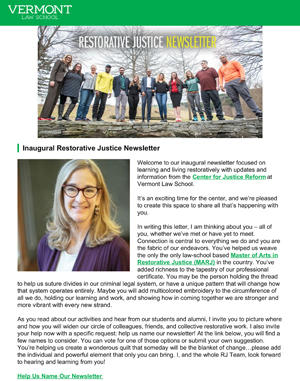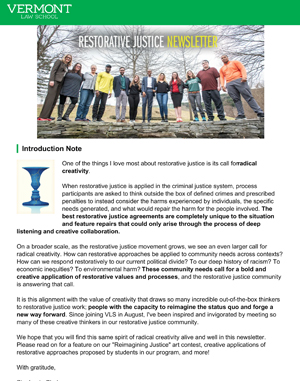The Vermont Journal of Environmental Law (VJEL) at Vermont Law School today announced Lynsey Gaudioso of Yale Law School the winner of its third annual White River Environmental Law Writing Competition.
VJEL awarded Gaudioso a $1,000 prize and publication in an upcoming issue for her winning paper titled "A Billion Grains of Truth: Distributional Impacts of Household-Level Climate Change Tax Subsidies in the United States."
"We had many strong articles to choose from this year so the selection process was very competitive," said VJEL Editor-in-Chief Rebecca Blackmon JD/MELP'17. "Ms. Gaudioso goes into a deep and focused discussion of environmental tax subsidies in the United States. We are looking forward to publishing her article in Volume 18 Book 4 this spring."
"This note catalogues and analyzes every federal and state renewable energy, energy efficiency and alternative fuel vehicle tax subsidy in the United States for certain key distributional elements," said Gaudioso. "States and the federal government give out several billion dollars in renewable energy, energy efficiency, and alternative fuel vehicles tax subsidies each year. How governments structure these subsidies has important distributional implications. Deductions, nonrefundable credits, and subsidies that favor owners over renters often preferentially accrue to the wealthy. The note finds that many subsidies fail to meet distributional goals. In response, the note offers pathways for subsidy reform going forward."
VJEL, the environmental law journal of Vermont Law School, home to the nation's top-ranked environmental law program, is positioned to reach audiences on a global scale and affords students a unique opportunity to participate in current debates surrounding far-reaching environmental law and policy issues.
Any student currently pursuing a juris doctor (JD) or master of laws (LLM) degree at an accredited law school in the U.S. is eligible to participate in the annual competition. While only one winner is selected, additional submissions may receive offers of publication. For more information about the White River Environmental Law Writing Competition, including eligibility and judging criteria, visit vjel.vermontlaw.edu/writing-competition. For more information about the Vermont Journal of Environmental Law, visit vjel.vermontlaw.edu or email vjel@vermontlaw.edu.
###
Vermont Law School, a private, independent institution, is home to the nation's largest and deepest environmental law program. VLS offers a Juris Doctor curriculum that emphasizes public service; three Master's Degrees—Master of Environmental Law and Policy, Master of Energy Regulation and Law, and Master of Food and Agriculture Law and Policy; and four post-JD degrees —LLM in American Legal Studies (for foreign-trained lawyers), LLM in Energy Law, LLM in Environmental Law, and LLM in Food and Agriculture Law. The school features innovative experiential programs and is home to the Environmental Law Center, South Royalton Legal Clinic, Environmental and Natural Resources Law Clinic, Energy Clinic, Food and Agriculture Clinic, and Center for Applied Human Rights. For more information, visit vermontlaw.edu, find us on Facebook, and follow us on Twitter and Instagram.


















